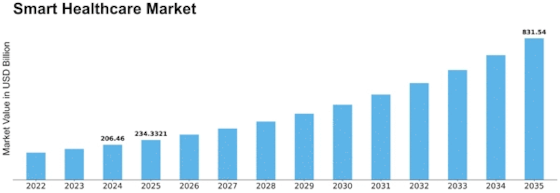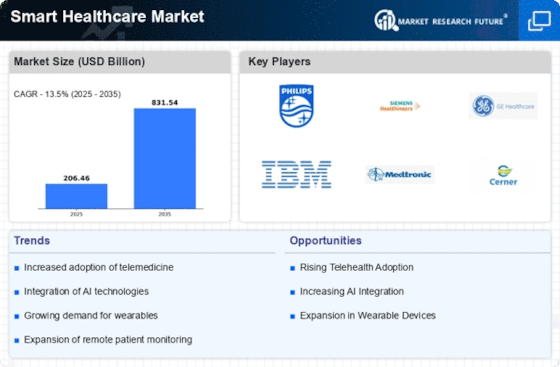Telemedicine
Wearable Devices
Healthcare IT Solutions
Remote Patient Monitoring
Chronic Disease Management
Health Management
Fitness Wellness
Medication Management
Hospitals
Clinics
Home Care
Pharmaceutical Companies
Hardware
Software
Services
North America
Europe
South America
Asia Pacific
Middle East and Africa
North America Outlook (USD Billion, 2019-2035)
Smart Healthcare Market by Technology Type
Telemedicine
Wearable Devices
Healthcare IT Solutions
Remote Patient Monitoring
Smart Healthcare Market by Application Type
Chronic Disease Management
Health Management
Fitness Wellness
Medication Management
Smart Healthcare Market by End Use Type
Hospitals
Clinics
Home Care
Pharmaceutical Companies
Smart Healthcare Market by Component Type
Hardware
Software
Services
Smart Healthcare Market by Regional Type
US
Canada
US Outlook (USD Billion, 2019-2035)
Smart Healthcare Market by Technology Type
Telemedicine
Wearable Devices
Healthcare IT Solutions
Remote Patient Monitoring
Smart Healthcare Market by Application Type
Chronic Disease Management
Health Management
Fitness Wellness
Medication Management
Smart Healthcare Market by End Use Type
Hospitals
Clinics
Home Care
Pharmaceutical Companies
Smart Healthcare Market by Component Type
Hardware
Software
Services
CANADA Outlook (USD Billion, 2019-2035)
Smart Healthcare Market by Technology Type
Telemedicine
Wearable Devices
Healthcare IT Solutions
Remote Patient Monitoring
Smart Healthcare Market by Application Type
Chronic Disease Management
Health Management
Fitness Wellness
Medication Management
Smart Healthcare Market by End Use Type
Hospitals
Clinics
Home Care
Pharmaceutical Companies
Smart Healthcare Market by Component Type
Hardware
Software
Services
Europe Outlook (USD Billion, 2019-2035)
Smart Healthcare Market by Technology Type
Telemedicine
Wearable Devices
Healthcare IT Solutions
Remote Patient Monitoring
Smart Healthcare Market by Application Type
Chronic Disease Management
Health Management
Fitness Wellness
Medication Management
Smart Healthcare Market by End Use Type
Hospitals
Clinics
Home Care
Pharmaceutical Companies
Smart Healthcare Market by Component Type
Hardware
Software
Services
Smart Healthcare Market by Regional Type
Germany
UK
France
Russia
Italy
Spain
Rest of Europe
GERMANY Outlook (USD Billion, 2019-2035)
Smart Healthcare Market by Technology Type
Telemedicine
Wearable Devices
Healthcare IT Solutions
Remote Patient Monitoring
Smart Healthcare Market by Application Type
Chronic Disease Management
Health Management
Fitness Wellness
Medication Management
Smart Healthcare Market by End Use Type
Hospitals
Clinics
Home Care
Pharmaceutical Companies
Smart Healthcare Market by Component Type
Hardware
Software
Services
UK Outlook (USD Billion, 2019-2035)
Smart Healthcare Market by Technology Type
Telemedicine
Wearable Devices
Healthcare IT Solutions
Remote Patient Monitoring
Smart Healthcare Market by Application Type
Chronic Disease Management
Health Management
Fitness Wellness
Medication Management
Smart Healthcare Market by End Use Type
Hospitals
Clinics
Home Care
Pharmaceutical Companies
Smart Healthcare Market by Component Type
Hardware
Software
Services
FRANCE Outlook (USD Billion, 2019-2035)
Smart Healthcare Market by Technology Type
Telemedicine
Wearable Devices
Healthcare IT Solutions
Remote Patient Monitoring
Smart Healthcare Market by Application Type
Chronic Disease Management
Health Management
Fitness Wellness
Medication Management
Smart Healthcare Market by End Use Type
Hospitals
Clinics
Home Care
Pharmaceutical Companies
Smart Healthcare Market by Component Type
Hardware
Software
Services
RUSSIA Outlook (USD Billion, 2019-2035)
Smart Healthcare Market by Technology Type
Telemedicine
Wearable Devices
Healthcare IT Solutions
Remote Patient Monitoring
Smart Healthcare Market by Application Type
Chronic Disease Management
Health Management
Fitness Wellness
Medication Management
Smart Healthcare Market by End Use Type
Hospitals
Clinics
Home Care
Pharmaceutical Companies
Smart Healthcare Market by Component Type
Hardware
Software
Services
ITALY Outlook (USD Billion, 2019-2035)
Smart Healthcare Market by Technology Type
Telemedicine
Wearable Devices
Healthcare IT Solutions
Remote Patient Monitoring
Smart Healthcare Market by Application Type
Chronic Disease Management
Health Management
Fitness Wellness
Medication Management
Smart Healthcare Market by End Use Type
Hospitals
Clinics
Home Care
Pharmaceutical Companies
Smart Healthcare Market by Component Type
Hardware
Software
Services
SPAIN Outlook (USD Billion, 2019-2035)
Smart Healthcare Market by Technology Type
Telemedicine
Wearable Devices
Healthcare IT Solutions
Remote Patient Monitoring
Smart Healthcare Market by Application Type
Chronic Disease Management
Health Management
Fitness Wellness
Medication Management
Smart Healthcare Market by End Use Type
Hospitals
Clinics
Home Care
Pharmaceutical Companies
Smart Healthcare Market by Component Type
Hardware
Software
Services
REST OF EUROPE Outlook (USD Billion, 2019-2035)
Smart Healthcare Market by Technology Type
Telemedicine
Wearable Devices
Healthcare IT Solutions
Remote Patient Monitoring
Smart Healthcare Market by Application Type
Chronic Disease Management
Health Management
Fitness Wellness
Medication Management
Smart Healthcare Market by End Use Type
Hospitals
Clinics
Home Care
Pharmaceutical Companies
Smart Healthcare Market by Component Type
Hardware
Software
Services
APAC Outlook (USD Billion, 2019-2035)
Smart Healthcare Market by Technology Type
Telemedicine
Wearable Devices
Healthcare IT Solutions
Remote Patient Monitoring
Smart Healthcare Market by Application Type
Chronic Disease Management
Health Management
Fitness Wellness
Medication Management
Smart Healthcare Market by End Use Type
Hospitals
Clinics
Home Care
Pharmaceutical Companies
Smart Healthcare Market by Component Type
Hardware
Software
Services
Smart Healthcare Market by Regional Type
China
India
Japan
South Korea
Malaysia
Thailand
Indonesia
Rest of APAC
CHINA Outlook (USD Billion, 2019-2035)
Smart Healthcare Market by Technology Type
Telemedicine
Wearable Devices
Healthcare IT Solutions
Remote Patient Monitoring
Smart Healthcare Market by Application Type
Chronic Disease Management
Health Management
Fitness Wellness
Medication Management
Smart Healthcare Market by End Use Type
Hospitals
Clinics
Home Care
Pharmaceutical Companies
Smart Healthcare Market by Component Type
Hardware
Software
Services
INDIA Outlook (USD Billion, 2019-2035)
Smart Healthcare Market by Technology Type
Telemedicine
Wearable Devices
Healthcare IT Solutions
Remote Patient Monitoring
Smart Healthcare Market by Application Type
Chronic Disease Management
Health Management
Fitness Wellness
Medication Management
Smart Healthcare Market by End Use Type
Hospitals
Clinics
Home Care
Pharmaceutical Companies
Smart Healthcare Market by Component Type
Hardware
Software
Services
JAPAN Outlook (USD Billion, 2019-2035)
Smart Healthcare Market by Technology Type
Telemedicine
Wearable Devices
Healthcare IT Solutions
Remote Patient Monitoring
Smart Healthcare Market by Application Type
Chronic Disease Management
Health Management
Fitness Wellness
Medication Management
Smart Healthcare Market by End Use Type
Hospitals
Clinics
Home Care
Pharmaceutical Companies
Smart Healthcare Market by Component Type
Hardware
Software
Services
SOUTH KOREA Outlook (USD Billion, 2019-2035)
Smart Healthcare Market by Technology Type
Telemedicine
Wearable Devices
Healthcare IT Solutions
Remote Patient Monitoring
Smart Healthcare Market by Application Type
Chronic Disease Management
Health Management
Fitness Wellness
Medication Management
Smart Healthcare Market by End Use Type
Hospitals
Clinics
Home Care
Pharmaceutical Companies
Smart Healthcare Market by Component Type
Hardware
Software
Services
MALAYSIA Outlook (USD Billion, 2019-2035)
Smart Healthcare Market by Technology Type
Telemedicine
Wearable Devices
Healthcare IT Solutions
Remote Patient Monitoring
Smart Healthcare Market by Application Type
Chronic Disease Management
Health Management
Fitness Wellness
Medication Management
Smart Healthcare Market by End Use Type
Hospitals
Clinics
Home Care
Pharmaceutical Companies
Smart Healthcare Market by Component Type
Hardware
Software
Services
THAILAND Outlook (USD Billion, 2019-2035)
Smart Healthcare Market by Technology Type
Telemedicine
Wearable Devices
Healthcare IT Solutions
Remote Patient Monitoring
Smart Healthcare Market by Application Type
Chronic Disease Management
Health Management
Fitness Wellness
Medication Management
Smart Healthcare Market by End Use Type
Hospitals
Clinics
Home Care
Pharmaceutical Companies
Smart Healthcare Market by Component Type
Hardware
Software
Services
INDONESIA Outlook (USD Billion, 2019-2035)
Smart Healthcare Market by Technology Type
Telemedicine
Wearable Devices
Healthcare IT Solutions
Remote Patient Monitoring
Smart Healthcare Market by Application Type
Chronic Disease Management
Health Management
Fitness Wellness
Medication Management
Smart Healthcare Market by End Use Type
Hospitals
Clinics
Home Care
Pharmaceutical Companies
Smart Healthcare Market by Component Type
Hardware
Software
Services
REST OF APAC Outlook (USD Billion, 2019-2035)
Smart Healthcare Market by Technology Type
Telemedicine
Wearable Devices
Healthcare IT Solutions
Remote Patient Monitoring
Smart Healthcare Market by Application Type
Chronic Disease Management
Health Management
Fitness Wellness
Medication Management
Smart Healthcare Market by End Use Type
Hospitals
Clinics
Home Care
Pharmaceutical Companies
Smart Healthcare Market by Component Type
Hardware
Software
Services
South America Outlook (USD Billion, 2019-2035)
Smart Healthcare Market by Technology Type
Telemedicine
Wearable Devices
Healthcare IT Solutions
Remote Patient Monitoring
Smart Healthcare Market by Application Type
Chronic Disease Management
Health Management
Fitness Wellness
Medication Management
Smart Healthcare Market by End Use Type
Hospitals
Clinics
Home Care
Pharmaceutical Companies
Smart Healthcare Market by Component Type
Hardware
Software
Services
Smart Healthcare Market by Regional Type
Brazil
Mexico
Argentina
Rest of South America
BRAZIL Outlook (USD Billion, 2019-2035)
Smart Healthcare Market by Technology Type
Telemedicine
Wearable Devices
Healthcare IT Solutions
Remote Patient Monitoring
Smart Healthcare Market by Application Type
Chronic Disease Management
Health Management
Fitness Wellness
Medication Management
Smart Healthcare Market by End Use Type
Hospitals
Clinics
Home Care
Pharmaceutical Companies
Smart Healthcare Market by Component Type
Hardware
Software
Services
MEXICO Outlook (USD Billion, 2019-2035)
Smart Healthcare Market by Technology Type
Telemedicine
Wearable Devices
Healthcare IT Solutions
Remote Patient Monitoring
Smart Healthcare Market by Application Type
Chronic Disease Management
Health Management
Fitness Wellness
Medication Management
Smart Healthcare Market by End Use Type
Hospitals
Clinics
Home Care
Pharmaceutical Companies
Smart Healthcare Market by Component Type
Hardware
Software
Services
ARGENTINA Outlook (USD Billion, 2019-2035)
Smart Healthcare Market by Technology Type
Telemedicine
Wearable Devices
Healthcare IT Solutions
Remote Patient Monitoring
Smart Healthcare Market by Application Type
Chronic Disease Management
Health Management
Fitness Wellness
Medication Management
Smart Healthcare Market by End Use Type
Hospitals
Clinics
Home Care
Pharmaceutical Companies
Smart Healthcare Market by Component Type
Hardware
Software
Services
REST OF SOUTH AMERICA Outlook (USD Billion, 2019-2035)
Smart Healthcare Market by Technology Type
Telemedicine
Wearable Devices
Healthcare IT Solutions
Remote Patient Monitoring
Smart Healthcare Market by Application Type
Chronic Disease Management
Health Management
Fitness Wellness
Medication Management
Smart Healthcare Market by End Use Type
Hospitals
Clinics
Home Care
Pharmaceutical Companies
Smart Healthcare Market by Component Type
Hardware
Software
Services
MEA Outlook (USD Billion, 2019-2035)
Smart Healthcare Market by Technology Type
Telemedicine
Wearable Devices
Healthcare IT Solutions
Remote Patient Monitoring
Smart Healthcare Market by Application Type
Chronic Disease Management
Health Management
Fitness Wellness
Medication Management
Smart Healthcare Market by End Use Type
Hospitals
Clinics
Home Care
Pharmaceutical Companies
Smart Healthcare Market by Component Type
Hardware
Software
Services
Smart Healthcare Market by Regional Type
GCC Countries
South Africa
Rest of MEA
GCC COUNTRIES Outlook (USD Billion, 2019-2035)
Smart Healthcare Market by Technology Type
Telemedicine
Wearable Devices
Healthcare IT Solutions
Remote Patient Monitoring
Smart Healthcare Market by Application Type
Chronic Disease Management
Health Management
Fitness Wellness
Medication Management
Smart Healthcare Market by End Use Type
Hospitals
Clinics
Home Care
Pharmaceutical Companies
Smart Healthcare Market by Component Type
Hardware
Software
Services
SOUTH AFRICA Outlook (USD Billion, 2019-2035)
Smart Healthcare Market by Technology Type
Telemedicine
Wearable Devices
Healthcare IT Solutions
Remote Patient Monitoring
Smart Healthcare Market by Application Type
Chronic Disease Management
Health Management
Fitness Wellness
Medication Management
Smart Healthcare Market by End Use Type
Hospitals
Clinics
Home Care
Pharmaceutical Companies
Smart Healthcare Market by Component Type
Hardware
Software
Services
REST OF MEA Outlook (USD Billion, 2019-2035)
Smart Healthcare Market by Technology Type
Telemedicine
Wearable Devices
Healthcare IT Solutions
Remote Patient Monitoring
Smart Healthcare Market by Application Type
Chronic Disease Management
Health Management
Fitness Wellness
Medication Management
Smart Healthcare Market by End Use Type
Hospitals
Clinics
Home Care
Pharmaceutical Companies
Smart Healthcare Market by Component Type
Hardware
Software
Services



















Leave a Comment